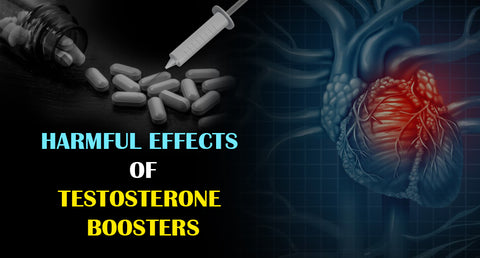With the growing interest and an increase in usage of supplements, it has become a typical part of our lives. Be it any daily health beverage, a whey protein shake or a multivitamin, our association with supplements is well-established. In this blog, we will talk about one such add-on which has become mainstream in recent years, especially among athletes - testosterone booster.
Testosterone is a male sex hormone. It is a steroidal hormone which is naturally produced in the body and secreted by the Leydig cells of testes in men. Testosterone boosters are supplements, consumed with an aim to increase the levels of this hormone in our blood. Testosterone levels vary at different age and start to decline from the age of 30. Elevated testosterone levels are associated with increased muscle synthesis and growth, due to which testosterone boosters are in demand among fitness enthusiasts. Testosterone boosters are easily available these days with varied composition and ingredients. Some of them may help in getting the desired result but what really needs to be addressed are their side effects.
Numerous studies have been conducted and several case reports submitted regarding the usage of testosterone boosters. Many of them have reported the presence of toxic and hormonal effects as a result of prolonged consumption of synthetic testosterone boosters (anabolic steroids). A case report was documented in 2008 at King Saud Hospital, Saudi Arabia where a 30-year old man was admitted as he complained of abdominal pain. His lab reports showed elevated levels of alanine aminotransferase (ALT) and aspartate aminotransferase (AST), indicating a damaged liver. The patient was an athlete and active user of testosterone boosters to enhance his sports performance and physique. Similarly based on other case studies, US FDA issued a safety announcement in 2018 stating that there is a possibility of cardiovascular disorders, heart stroke, cardiac arrest and even death in association with the usage of testosterone boosters. Tropical applications of testosterone boosters also has adverse effects on our health. This was observed under a study on 209 men with a mean age of 74 years. They were advised to use testosterone gels daily for 6 months. The study was conducted by Basaria S. et al. (2010) and noticed an increased cardiac, dermatological and respiratory rates as harmful effects among the testosterone group. Some other common side effects of using testosterone boosters are gynecomastia, hair loss, acne, alopecia, insomnia, hypertension, liver damage, erectile dysfunction and prostate enlargement.
With the widely availability of options and marketing gimmicks of the companies, testosterone boosters have succeeded to grab the attention of adolescents as well. Studies indicate that due to the consumption of anabolic steroids, the risk of premature closing of epiphyseal plate increases. This might lead to a premature and stunted growth. Testosterone boosters also magnify the risk of tendon tear in athletes as a consequence of collagen degeneration. Another risk which is closely associated with synthetic testosterone boosters are psychological and behavioural effects. There have been reports of people becoming more aggressive, irritable with increased mood swings and psychotic episodes.
Testosterone boosters may have potential health risks. Hence, instead of opting for artificial anabolic boosters, practice healthy tips and consume a well-balanced diet to maintain adequate hormone levels. The purpose of this literature is to make you aware and prioritise the adverse effects of testosterone boosters before you make a wrong decision. Having a regular exercise regime, consuming a healthy diet in terms of carbs, protein and fats, maintaining adequate vitamin D and other micronutrient levels, keeping stress at bay and getting a good sleep is the formula to sustain vital hormonal levels.
REFERENCES
•Almaiman A. A. (2018). Effect of testosterone boosters on body functions: Case report. International journal of health sciences, 12(2), 86–90.
•FDA Drug Safety Communication: FDA cautions about using testosterone products for low testosterone due to ageing; requires labelling change to inform of possible increased risk of heart attack and stroke with use(2018). Retrieved from https://www.fda.gov/drugs/drug-safety
•Martin, S. J. , Sherley, M., McLeod, M. (2018).Adverse effects of sports supplements in men. Aust Prescr 2018;41:10-13
•Hoffman, J. R., & Ratamess, N. A. (2006). Medical issues associated with anabolic steroid use: are they exaggerated?. Journal of sports science & medicine, 5(2), 182–193.

